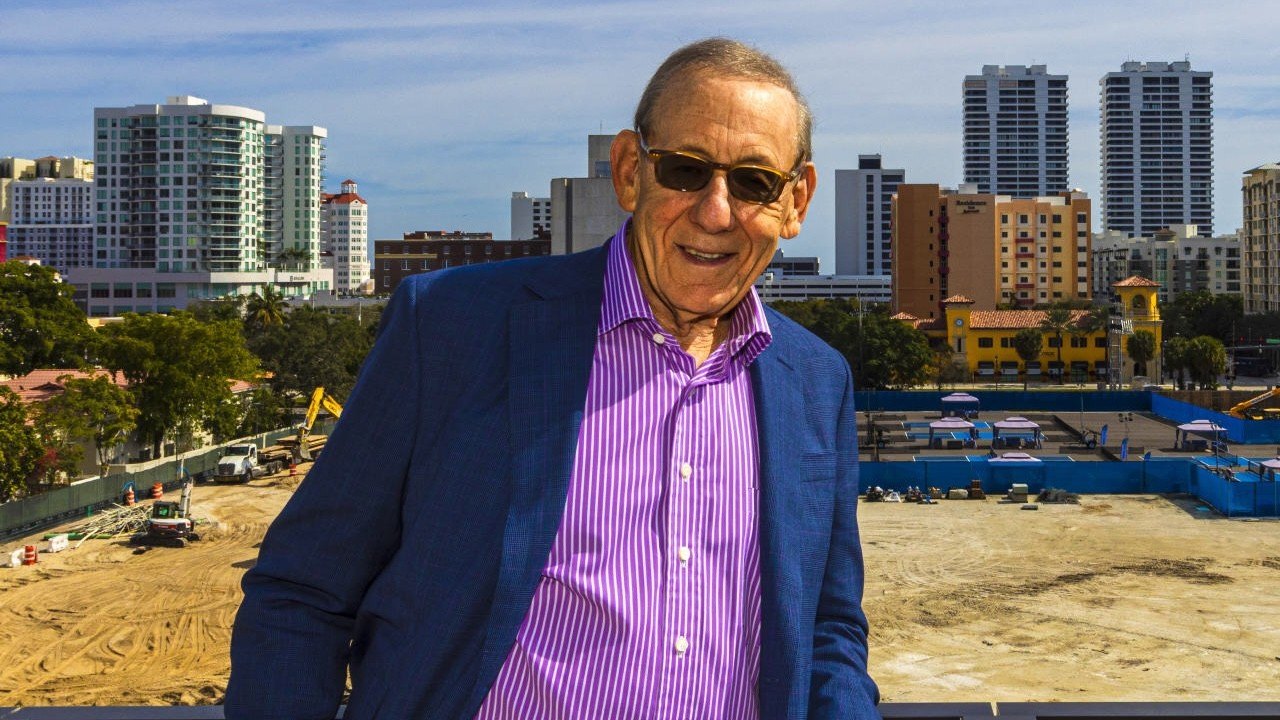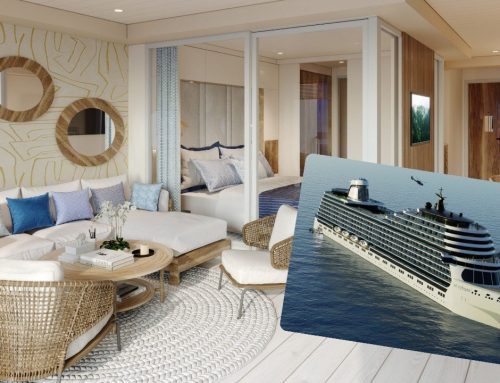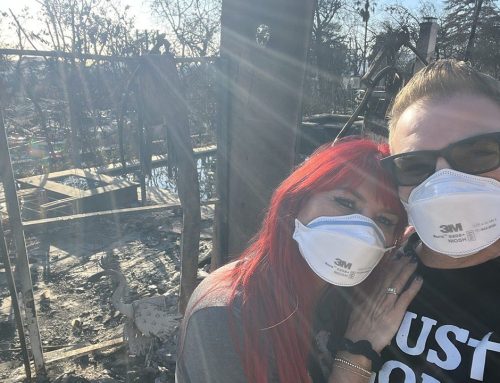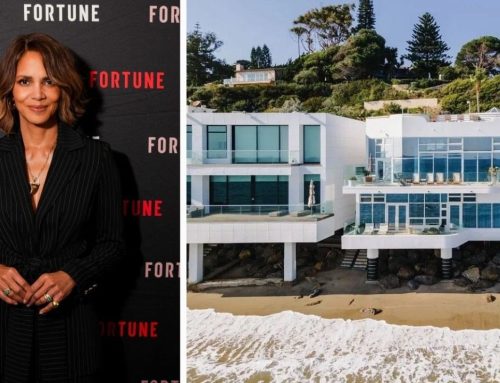
Saul Martinez for WSJ
WEST PALM BEACH, Fla.—When Mayor Keith James first met billionaire real-estate developer Stephen Ross at the 2019 groundbreaking for a high-end apartment building, Ross wasn’t shy about his lavish ambitions for this once overshadowed South Florida town.
The Laurel was to be the city’s most luxurious rental building, with a rooftop pool, Pilates studio and private dining room. The resort-style complex was just the start of Ross’s plans.
“I want you to know, Mr. Mayor, that I am spending money in your city like a drunken sailor,” Ross told James at the groundbreaking ceremony. The newly elected mayor of West Palm Beach was floored.
“When a billionaire says that, you know that’s quite a bit of money,” James said in a recent interview.
The full scope of Ross’s vision for West Palm didn’t come into focus until months later, when the developer, then working with Related Cos., shared renderings for hundreds of thousands of square feet of high-end office space.
Today, Ross’s new real-estate firm, Related Ross, is on its way to spending nearly $10 billion to transform this once-gritty South Florida city into a business and financial center.
If all goes to plan, Ross’s West Palm developments are expected to add more than 6 million square feet of office space, 1.4 million square feet of condos, 700,000 square feet of retail and restaurant space and 870 hotel rooms across 70 acres of land in West Palm.
In trying to lure companies to West Palm, Ross is taking on Silicon Valley, Wall Street and Miami. He argues that venture-capital and tech firms in California have tired of the state’s high taxes, regulation and business climate that’s less friendly than Florida’s. Same for asset-management and financial firms in New York. Ross also senses an opening from what he calls “Miami fatigue,” the sensation that the fast-growing metropolis to the south has become too urban, too congested and too expensive.
His goal is to create what he calls the “model American city.” It’s a big transition for an area long seen as the poorer sister to nearby Palm Beach, the affluent island of multimillion-dollar mansions and resorts.
“Turning a profit is not the priority,” Ross said. “To create a city where the best and brightest want to live, work and play—it gets your juices going.”
In addition to commercial and residential properties, Ross has worked to bring new private schools, a hospital and a Vanderbilt University extension to West Palm.
Some locals grouse they are getting priced out as the private schools and yoga studios move in. In response, Ross says he is talking to the city about developing more affordable and workforce housing.
At 84 years old and with a lifetime full of reshaping major city skylines, Ross has taken on what may be his most ambitious project yet. And West Palm’s multi-phased completion is likely a decade or so away.
“This is not proven. I may not be successful,” he acknowledged one recent afternoon while picking at a Niçoise salad in the restaurant of his West Palm office building. But then a little later, he smiled and said: “This is the most fun I’ve ever had in my life.”
Ross founded Related Cos. in New York in 1972, with a focus on developing low- and moderate-income apartments. While Related remains one of the country’s biggest owners of affordable housing, it’s famous today for its luxury retail and high-end condos. He moved from developing individual buildings to re-creating neighborhoods when he built New York City’s Time Warner Center (now known as Deutsche Bank Center), a luxury mixed-use complex. Then in Los Angeles he launched the Grand LA, a $1 billion hotel, residential and retail complex designed by star architect Frank Gehry.
By the time he progressed to the $25 billion Hudson Yards project on the West Side of Manhattan, he was building a city within a city. It was one of the most expensive developments ever attempted. While the retail component struggled in the beginning—the Neiman Marcus store closed during early Covid days—and condo sales have been mixed, the offices at Hudson Yards are nearly fully occupied and command some of the highest rents in the city.
As Related Cos. branched out with major development projects throughout the U.S. and from London to Abu Dhabi, the company grew to include 4,000 professionals and $70 billion in assets owned or under development around the globe.
But Ross decided that his remaining years would focus on Palm Beach County.
After originally owning a vacation home in West Palm, Ross purchased an 11,000-square-foot mansion across the lagoon in Palm Beach for $31.9 million in 2007. During Covid, it became his primary residence—a return of sorts to the sunshine state. Born in Detroit, Ross moved to Miami Beach in high school. He then attended the University of Florida for two years before transferring to the University of Michigan.
Last year, Ross stepped down from Related Cos., a transition that had been under way for more than a decade. He is still the firm’s largest shareholder and nonexecutive chairman.
Rather than luxuriate in retirement in Florida, Ross founded Related Ross to focus on what he came to realize during the pandemic was an unusual opportunity in West Palm.
In the late 1980s, West Palm wasn’t the sort of place that attracted hedge-fund traders or tech entrepreneurs. Crime and the crack epidemic hit its streets. By the 1990s, local officials began the long slog of improving downtown and the waterfront.
The local government took over a strip of land and asked for proposals on how to develop it. Ross pounced, won the rights and built a retail complex. In the early days, he rotated through a variety of retail tenants, but nothing really gained traction with the local community.
Ross pumped more money into the CityPlace project, booting out Macy’s and a movie complex and signing up retailers he had done business with in New York, like Lululemon and upscale design store Herman Miller.
Related Cos. executives back in New York were less enthusiastic at the time, viewing West Palm more as Ross’s passion project than a big moneymaker, say people familiar with the matter.
West Palm historically didn’t have much office space, partly because many professionals visited only on weekends or for a few weeks in the winter. Then Covid-19 erupted. People in Palm Beach wanted nearby office space and flocked to Ross’s 360 Rosemary office tower, which opened in 2021. Firms based in the New York metro area, including Goldman Sachs, BlackRock and Steve Cohen’s Point72, opened satellite offices in his West Palm tower.
Unlike other projects where Ross has major equity partners to help share the risk, he is largely self-funding his West Palm dream, in part by selling minority stakes in his Miami Dolphins football team. Forbes estimates his personal wealth at more than $18 billion. He also owns Hard Rock Stadium, where the team plays, and he was instrumental in bringing Formula One racing to Miami.
Ross is known for getting complex deals across the finish line. At Hudson Yards, he created developable land by building a platform on top of a New York City rail yard. For Time Warner Center, he devised a new tax structure for him and his joint-venture partners that avoided double transfer tax.
“So much of what we did hadn’t been done before from a legal, structural and financial point of view,” said Jay Neveloff, chair of the real-estate practice at law firm Kramer Levin, who worked with Ross on both projects.
Ross is adding another layer of complexity in Florida. In a smaller city like West Palm, he needs to provide the sort of infrastructure necessary to support a rapidly growing population such as Palm Beach County, which has expanded by about 50% since 1999 to more than 1.5 million.
Business executives worry about their kids’ education, so Ross reached a deal to bring a private K-12 school to the nearby town of Wellington. It is to be the first nonprofit and U.S.-based campus from a founder of Education in Motion, a Singapore-based private-school network. It’s expected to cost $350 million to build, and classes are scheduled to begin in three years.
He helped orchestrate a deal for the Cleveland Clinic to operate a hospital in West Palm and is contributing $50 million toward its $500 million development. He also helped persuade Vanderbilt University to open a graduate business school in about two to three years with construction costs of more than $500 million (another $50 million is coming from Ross). The university was also exploring a new campus in Miami, but Ross helped steer the school to his city.
“That really enhances the status of West Palm,” said Jorge Perez, a longtime friend of Ross’s and the chief executive of Related Group, a Miami-based real-estate firm that was previously affiliated with Related Cos. in New York. “It’s sort of a Good Housekeeping seal of approval.”
These days, Ross gets up early to work out for 45 minutes and then is at the office by 9:30 a.m. until at least 7:30 p.m. most days. He has given up much of his travel outside of Florida, save for attending Dolphins road games. He still regularly plays 9 to 12 holes of golf, often joined by his fiancée, Lynn Connolly, who once ranked in the top 25 of the LPGA.
Bill Washington showed up to hear Ross speak this month at a ribbon-cutting event for his latest West Palm office tower, known as One Flagler. The 75-year-old is a longtime West Palm resident and runs a local Ethiopian restaurant with his wife. He said he admires the developer’s gleaming towers and considers himself pro-development, but he worries about the lack of affordable housing.
“We hear all the time that people are moving to Georgia because they cannot afford the rents” in West Palm, Washington said.
Ross is negotiating to pay the city “several million dollars” to buy a parcel of land in West Palm for another private school, according to James, the West Palm mayor. The proceeds from the city’s land sale would go toward improvements at a West Palm public school in a lower-income neighborhood.
“Ross invested in building a community,” James said. “Not just putting up pretty buildings.”



